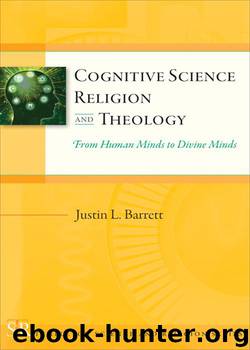Cognitive Science, Religion, and Theology: From Human Minds to Divine Minds (Templeton Science and Religion Series) by Barrett Justin L

Author:Barrett, Justin L. [Barrett, Justin L.]
Language: eng
Format: mobi, epub
ISBN: 9781599474007
Publisher: Templeton Press
Published: 2011-09-30T16:00:00+00:00
CHAPTER 8
From Natural Religion to Theology
IN THE FIRST six chapters I tried to build the case that human minds have a number of natural features that importantly shape the sorts of ideas we are likely to entertain and believe. In particular, content-specific cognitive systems, such as those responsible for reasoning about the properties and movement of physical objects, those concerned with living things, and those driven to find and reason about intentional agency help us make sense of the world we inhabit. This content-specific cognition that is critical for making sense of the world around us cooperates to make us receptive to many religious beliefs, including the existence of gods. Consequently, people the world over entertain religious beliefs and act upon these beliefs to form religions. Chapter 7 concerned some of the ways in which, similar to beliefs, natural cognition informs religious experiences and practices. For my purposes, religion refers to the collection of beliefs related to the existence of one or more gods, and the activities that are motivated by these beliefs.
The natural cognitive tendencies that help generate and support religious thought become elaborated in divergent ways—sometimes in ways that depart radically from the natural cognitive anchors, resulting in theologies. The cognitive dynamics surrounding this divergence is the topic of this chapter.
NATURAL RELIGION
Cognitive linguists have suggested that our natural cognitive systems inform and constrain our acquisition and use of language.1. Because of the anchoring effect of natural cognition, only a tiny range of the theoretically possible universe of languages is actualized. For children to pick up and use a language easily and fluently, it must be a natural language. Of course, for these same reasons, the languages we encounter are natural languages: Arabic, Cantonese, English, Hindi, and Spanish are all natural languages. If a language started deviating too far from the natural cognitive anchors, it would be pruned back to natural language. In contrast, the various computer-programming languages that have been invented are unnatural, artificial languages, for which our minds do not have any comparable receptivity, which is why they require special education and training to use, and even experts never reach the fluency of natural language.
Analogously, natural cognition creates receptivity to what might be called natural religion. Natural religion is the cultural expression of numerous natural tendencies that I have described in previous chapters (especially chapter 6), which encourage belief in gods and related concepts and practices. Like natural language, natural religion has an intuitive core supported by naturally occurring nonreflective beliefs. Further, as in language, religious expression that conforms closely to the parameters of natural language will be easily acquired by children (and adults), readily understood and talked about, and will tend to be widespread across individuals and cultures. But also as in language, the anchoring effect of natural religion allows for variability. As formal study of language can increase one’s linguistic expression beyond what is simply natural (such as in complex linguistic constructions, extremely large vocabularies, and facility with figurative language), so too religious expression can extend beyond the most basic features of natural religion.
Download
Cognitive Science, Religion, and Theology: From Human Minds to Divine Minds (Templeton Science and Religion Series) by Barrett Justin L.epub
This site does not store any files on its server. We only index and link to content provided by other sites. Please contact the content providers to delete copyright contents if any and email us, we'll remove relevant links or contents immediately.
Rewire Your Anxious Brain by Catherine M. Pittman(18644)
Talking to Strangers by Malcolm Gladwell(13350)
The Art of Thinking Clearly by Rolf Dobelli(10455)
Mindhunter: Inside the FBI's Elite Serial Crime Unit by John E. Douglas & Mark Olshaker(9324)
Becoming Supernatural by Dr. Joe Dispenza(8204)
Change Your Questions, Change Your Life by Marilee Adams(7761)
Nudge - Improving Decisions about Health, Wealth, and Happiness by Thaler Sunstein(7693)
The Road Less Traveled by M. Scott Peck(7594)
The Lost Art of Listening by Michael P. Nichols(7494)
Mastermind: How to Think Like Sherlock Holmes by Maria Konnikova(7323)
Enlightenment Now: The Case for Reason, Science, Humanism, and Progress by Steven Pinker(7306)
Win Bigly by Scott Adams(7184)
The Way of Zen by Alan W. Watts(6601)
Daring Greatly by Brene Brown(6504)
Big Magic: Creative Living Beyond Fear by Elizabeth Gilbert(5756)
Grit by Angela Duckworth(5605)
Ego Is the Enemy by Ryan Holiday(5415)
Men In Love by Nancy Friday(5234)
The Laws of Human Nature by Robert Greene(5177)
